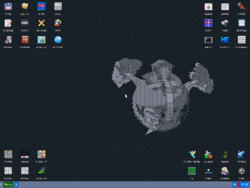Difference between revisions of "Main Page"
Jump to navigation
Jump to search
m (GSoC'2017 -> GSoC'2018) |
|||
| (38 intermediate revisions by 4 users not shown) | |||
| Line 2: | Line 2: | ||
{{Infobox_OS | | {{Infobox_OS | | ||
name = KolibriOS | | name = KolibriOS | | ||
| − | logo = [[Image: | + | logo = [[Image:logo_100.png|KolibriOS logo]]| |
screenshot = [[Image:KolibriOS.png|250px]]| | screenshot = [[Image:KolibriOS.png|250px]]| | ||
caption = KolibriOS desktop| | caption = KolibriOS desktop| | ||
developer = [http://www.kolibrios.org/?p=ContactUs KolibriOS Project Team]| | developer = [http://www.kolibrios.org/?p=ContactUs KolibriOS Project Team]| | ||
| − | |||
| − | |||
working_state = Active | | working_state = Active | | ||
| − | |||
| − | |||
kernel_type = [http://en.wikipedia.org/wiki/Monolithic_kernel Monolithic kernel] | | kernel_type = [http://en.wikipedia.org/wiki/Monolithic_kernel Monolithic kernel] | | ||
license = [[GNU General Public License|GPL]] | | license = [[GNU General Public License|GPL]] | | ||
| Line 16: | Line 12: | ||
}} | }} | ||
| − | KolibriOS is an [http://en.wikipedia.org/wiki/ | + | KolibriOS is an [http://en.wikipedia.org/wiki/Open-source_software open source] [http://en.wikipedia.org/wiki/Operating_system operating system] for 32-bit [http://en.wikipedia.org/wiki/x86_architecture x86] computers based on [http://en.wikipedia.org/wiki/MenuetOS MenuetOS], written entirely in [http://en.wikipedia.org/wiki/FASM Assembler/FASM]. |
| − | + | ||
| + | '''IMPORTANT:''' Help KolibriOS development by working on ideas from the [[Google Summer of Code 2018]] list! | ||
<center> | <center> | ||
{| align="center" class="wikitable" | {| align="center" class="wikitable" | ||
| − | ![ | + | ![http://www.kolibrios.org/ Home] |
| − | ![[ | + | ![[FAQ|FAQ]] |
|- | |- | ||
| − | ![ | + | ![http://board.kolibrios.org/ Forum] |
| − | ![[ | + | ![[HowTo|Documentation]] |
|- | |- | ||
| − | ![ | + | ![http://builds.kolibrios.org/ Nightly Builds] |
| − | ![[ | + | ![[Development|Development]] |
|- | |- | ||
| − | ![http:// | + | ![http://bugs.kolibrios.org/ Bug Tracker] |
| − | ![ | + | ![[Kolibri_tomorrow|Wanted Features]] |
|- | |- | ||
| − | ![http:// | + | ![http://websvn.kolibrios.org/ Source Repository] |
| − | ![ | + | ![[Applications|Applications]] |
|- | |- | ||
| − | ![ | + | ![http://ftp.kolibrios.org/ File Repository] |
| − | ![[ | + | ![[Hardware_Support|Hardware Support]] |
|- | |- | ||
| − | ![[ | + | ! |
| + | ![[Special:Categories|All categories]] | ||
|} | |} | ||
</center> | </center> | ||
== KolibriOS Features == | == KolibriOS Features == | ||
| − | * | + | * A [http://en.wikipedia.org/wiki/Monolithic_kernel monolithic] [http://en.wikipedia.org/wiki/Preemption_(computing) preemptive] [http://en.wikipedia.org/wiki/Kernel_(computer_science) kernel] that is less than 100 kilobytes in size, complete with streams, parallel execution of system calls, a USB and [[New_stack|TCP/IP]] stack. |
| − | + | * Speed: Thanks to being (carefully) written in Assembler, it's very fast. | |
| − | + | * Size: KolibriOS is very small - The kernel and most of the programs fit on a 1.44MB floppy disk! | |
| − | + | * Filesystem support: Read/write support for FAT16/32 (with long file names) and ext2/3/4, read-only support for NTFS, XFS and CDFS(ISO9660). | |
| − | + | * Lightweight: Kolibri boots on any computer that has a Pentium (i586) compatible processor and at least eight megabytes of RAM. | |
| − | * | + | * Hardware support: A lot of the popular sound, network and graphics cards are supported (see [[Hardware_Support|supported hardware list]]) |
| − | * | + | * Comes with a development kit (code editor with [http://en.wikipedia.org/wiki/FASM FASM] macro-assembler integrated). |
| − | * | ||
| − | * | ||
| − | |||
| − | |||
| − | == | + | == Branches == |
| − | * | + | * [[EmbeddedKOS|Kolibri-A]] - an embedded version of KolibriOS |
| − | |||
<!-- Categories --> | <!-- Categories --> | ||
Revision as of 16:40, 18 October 2017
| KolibriOS | |

| |
 KolibriOS desktop | |
| Website: | www.kolibrios.org |
| Developed by: | KolibriOS Project Team |
| License: | GPL |
| Kernel type: | Monolithic kernel |
| Working state: | Active |
KolibriOS is an open source operating system for 32-bit x86 computers based on MenuetOS, written entirely in Assembler/FASM.
IMPORTANT: Help KolibriOS development by working on ideas from the Google Summer of Code 2018 list!
| Home | FAQ |
|---|---|
| Forum | Documentation |
| Nightly Builds | Development |
| Bug Tracker | Wanted Features |
| Source Repository | Applications |
| File Repository | Hardware Support |
| All categories |
KolibriOS Features
- A monolithic preemptive kernel that is less than 100 kilobytes in size, complete with streams, parallel execution of system calls, a USB and TCP/IP stack.
- Speed: Thanks to being (carefully) written in Assembler, it's very fast.
- Size: KolibriOS is very small - The kernel and most of the programs fit on a 1.44MB floppy disk!
- Filesystem support: Read/write support for FAT16/32 (with long file names) and ext2/3/4, read-only support for NTFS, XFS and CDFS(ISO9660).
- Lightweight: Kolibri boots on any computer that has a Pentium (i586) compatible processor and at least eight megabytes of RAM.
- Hardware support: A lot of the popular sound, network and graphics cards are supported (see supported hardware list)
- Comes with a development kit (code editor with FASM macro-assembler integrated).
Branches
- Kolibri-A - an embedded version of KolibriOS